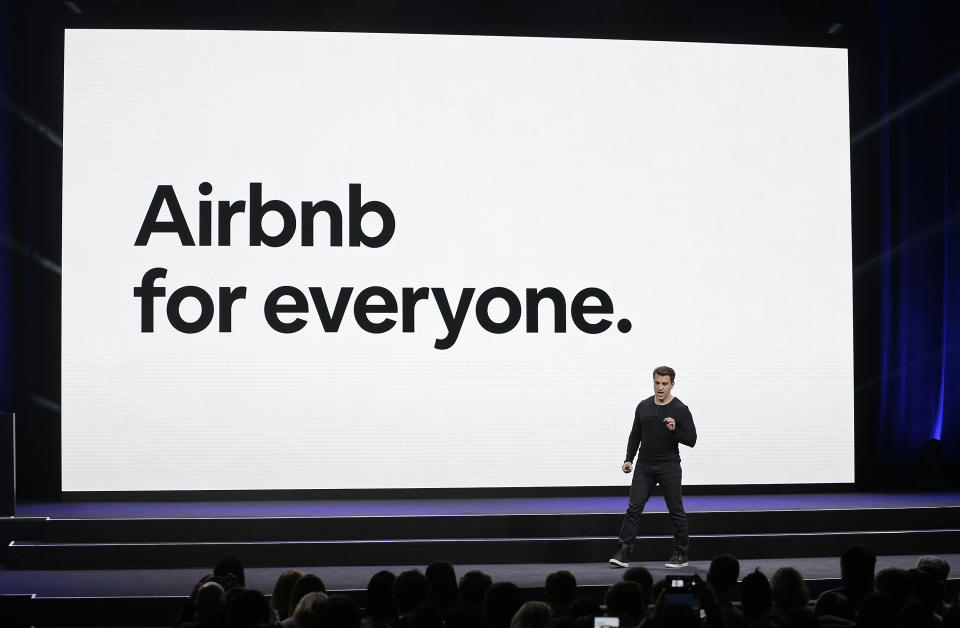Airbnb’s growth seems to be slowing down
Hotel disruptor Airbnb is facing a slowdown in growth, according to a new report from eMarketer.
eMarketer predicts that Airbnb will have 38.4 million U.S.-based users in 2018, which represents a 13% increase from last year but less than earlier estimates. In a previous forecast, the market research firm projected Airbnb would have 43.2 million users this year. Longer term, eMarketer predicts Airbnb will add 6.1 million users in the U.S. by 2021, a fraction of the 17.6 million previously projected. As of March, Airbnb has 150 million users globally.
“Airbnb saw healthy growth in its infancy because it was often more affordable than hotels,” said eMarketer analyst Jaimie Chung. “However, user growth is plateauing as competition from online travel agents like Expedia and Travelocity grows. Travelers also have lingering concerns about security and privacy following several high-profile incidents.”
In April, three black people were leaving their Airbnb in Rialto, California, when a neighbor called the cops to report a possible burglary. Last year, an AIrbnb host had to pay $5,000 and take a course on Asian-American studies after canceling a reservation based on the guest’s race.

The unpredictability of Airbnb stays may also contribute to the slowdown in users’ interest. Another reason may be the simple fact that many cities are imposing limits to how many days a host can list a property for. The main rationale? Airbnb listings push up rent prices for locals. Regulatory crackdowns are happening across U.S. cities like New York, Chicago and Las Vegas as well as globally in Sydney, Madrid, Madrid, Paris, Dublin and Tokyo, to name a few.
In Japan, a new law for private lodging services, or “minpaku,” goes into effect on June 15. It will require that homeowners register their rental properties with the local government. Nearly 80% of the listings across the country have been pulled down since the law was announced three months ago.
Airbnb’s influence
In response to eMarketer’s analysis, Airbnb spokesperson Nick Papas told Yahoo Finance, “This report is wrong and simply does not reflect the strong growth we continue to see in the United States and around the world.”
Airbnb has undeniably been a disruptive force for the traditional hospitality industry. This April, Marriott launched a six-month program with London-based Hostmaker, which manages rental properties, including Airbnb’s.
As hotel behemoths are trying to tap into Airbnb’s core customer, Airbnb is trying to lure in the lucrative business traveler, who may often spend more than the leisure consumer. Especially as millennials, who grew up with ride-hailing and home-sharing apps, dominate the workforce, this may be a bright spot of growth for the 10-year-old darling.
eMarketer expects Airbnb to focus on mobile engagement as the company integrates artificial intelligence (AI) and virtual reality (VR) to create a more robust app. Digital travel sales in general in the U.S. are expected to grow 5.0% this year to reach $200.43 billion. About 35% will come from mobile, while 65% will come from desktops and laptops, according to eMarketer.
“Desktops and laptops remain relevant in the travel industry because comparison shopping is easier on a bigger screen,” Chung said. “In fact, eMarketer has lowered its mobile estimates, as mobile travel bookings have not grown in line with other industries — likely due to consumers’ preference for making these larger purchases on desktops and laptops.”
As Airbnb’s influence and impact trickle into the mainstream hospitality industry, travelers are discovering other ways to enjoy flexible and affordable stays without turning to the site.
This article has been updated.
Melody Hahm is a writer at Yahoo Finance, covering entrepreneurship, technology and real estate. Follow her on Twitter @melodyhahm.
Read more:
Airbnb’s next frontier: the business traveler
Women’s-only club The Wing opens its doors to men for a special occasion

